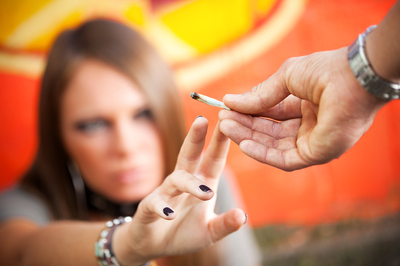
This toast may be good fun for some; for others, it may be a life-threatening addiction that can lead to death.
Understanding Drug Addiction
According to the NIH’s National Institute on Drug Abuse (NIDA), “Addiction is a chronic brain disease that causes a person to compulsively seek out drugs, despite the harm they cause. The first time a person uses drugs, it’s usually a free choice they’ve made. However, repeated drug use causes the brain to change, which drives a person to seek out and use drugs over and over, despite negative effects such as stealing, losing friends, family problems, or other physical or mental problems brought on by drug use—this is addiction.”
Why Some Brains Get Hooked
This definition may leave you wondering why some people abuse substances and become addicts, while others seemingly can use without falling victim to the horrors of addiction? The brain also plays a role here.
For starters, the earlier you begin using drugs, the more susceptible you are to becoming addicted. Scientists suggest that this may be linked with the particularly harmful effects of substances on developing brains, although genetics, mental illness, unstable relationships, and exposure to abuse (both physical and sexual) are also thought to factor in. (That said, drug use can lead to addiction at any age.)

A number of factors may predispose her to addiction.
Other factors that increase the risk of addiction include living in a home with parents or other family members who abuse substances; being part of a peer group of abusers; academic failure and poor social skills; and method of use.
Continues NIDA, “Smoking a drug or injecting it into a vein increases its addictive potential. Both smoked and injected drugs enter the brain within seconds, producing a powerful rush of pleasure. However, this intense ‘high’ can fade within a few minutes, taking the person down to lower levels. Scientists believe that this low feeling drives individuals to repeat drug use in an attempt to recapture the high pleasurable state.”
Drugs and Death
We’ve discussed how drugs interrupt the brain’s communication channels, ultimately leading to the overstimulation of “reward circuits.” But this doesn’t directly address how this can lead to death. In short, too much of anything is a bad thing, and overdoses of substances, combinations of substances, and/or repeated use of substances can be fatal.
Take alcohol, for example. Says the Genetic Science Learning Center, “Alcohol overdoses occur mainly in two ways. First, by decreasing the excitatory effect of glutamate, alcohol causes unconsciousness. At high levels, it can also slow or stop breathing. Second, the body tries to rid itself of unabsorbed alcohol by emptying the stomach. If a person vomits while they are unconscious, they may inhale the vomit and compromise their breathing or even drown.”
With stimulants, increased levels of neurotransmitters and hormones can lead to everything from death by overheating to heart attack to ruptured blood vessels in the brain.
At the same time, withdrawal in uncontrolled situations can also be dangerous. When the human brain is suddenly forced to adjust to changes in biochemical levels, a number of consequences can occur, including depression, anxiety, cravings, restlessness, poor concentration, memory problems, mood swings, fatigue, insomnia, confusion, sensory alterations, and delirium.
Help for Addiction
The good news is that today’s drug addiction rehab programs are uniquely qualified to provide safe and effective treatments for addicted brains and bodies. Stay tuned for the fourth and final entry in this blog series, which will go into greater depth about the vital role rehabilitation programs play in helping addicts manage drug withdrawal and achieve recovery.
We’re Here to Help
If you need help for an addiction disorder, please do not wait. Contact us today to for more information on addiction recovery in St. Louis.







